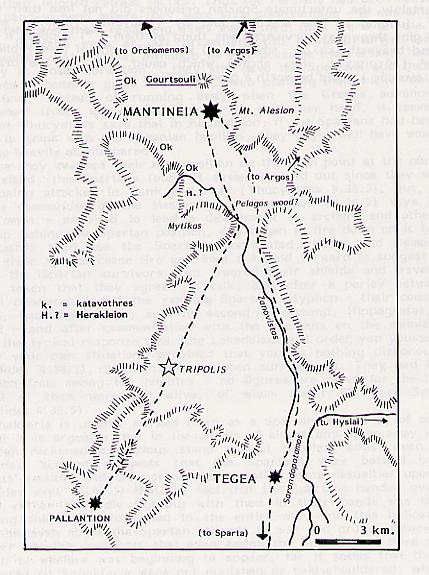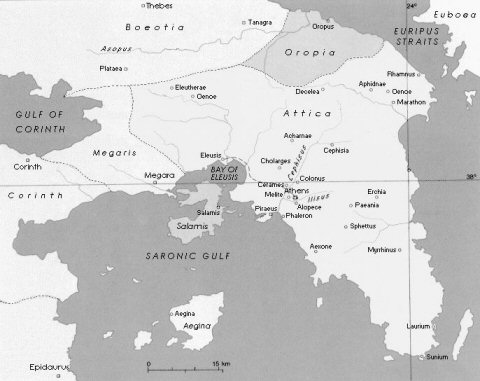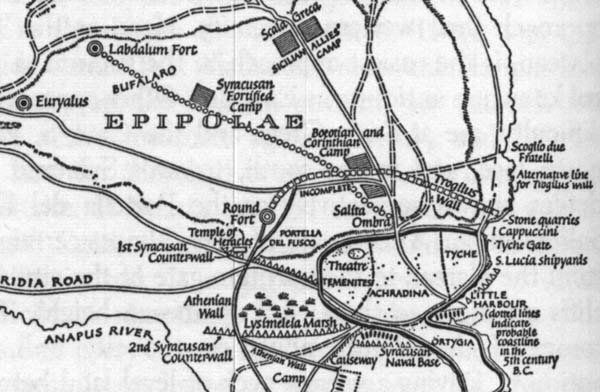
Negotiations for peace were carried out over the course of autumn and winter, and by early spring of 421, a real peace was concluded: Nicias and Pleistoanax being the major authors of the 50 years peace. The main points were:
Peloponnesian league met to ratify the peace, but Corinth, Boeotia, Megara, and Elis voted against it but the weaker members of the alliance went with Sparta and thus ensured a majority vote for peace.
Things go badly from the start, the Chalcidians refuse to surrender Amphipolis back to the Athenians, and Sparta is in no position to compel them. Thus Athens has no motivation to carry out its part of the bargain.
Spartans anxious to make the peace work for several reasons, the recovery of prisoners from Spachteria and the 30 years truce with Argos is about to expire, Sparta is not anxious to fight both Athens and Argos.To make things work, Sparta negotiates a defensive alliance with Athens, supported by Nicias, the prisoners are restored and Athens holds on to Pylos and Cythera, since it never got Amphipolis back.
This alliance caused a disruption of the Peloponnesian league, Corinth, Mantinea, and Elis break away and form an alliance with Argos, and they were joined by the Chalcidians. In 420 Alcibiades is chosen as strategos in the place of Nicias and Athens enters into alliance with Argos and its allies Elis and Mantinea and seals the treaty by aiding Argos in an expedition against Epidaurus. Sparta comes to the aid of Epidaurus, and as a result Athens declares that Sparta had broken the peace. Interestingly the Spartan reinforcements arrived by sea unhindered by the much stronger Athenian naval forces.
 |
At that point, the Athenians arrived with 1000 hoplites and 300 cavalry under command of Nicostratus and Laches with Alcibiades as ambassador, they convince their Argive allies that the truce is invalid, since the Athenians hadn't been there to ratify it, and that therefore they could break it with impunity.
Allied troops cross into Arcadia, persuade Orchomenos to come over to them, and move on to Mantinea to put pressure on the city of Tegea. The Spartans are alarmed at the defection of Orchomenos, and particularly worried lest Tegea fall. They start moving toward Tegea, and order their Arcadian allies to meet them en route. Also they send to Corinth and Boeotia for reinforcements, but they have to cross hostile territory and won't make it in time. Agis hopes to force a battle this time by ravaging the crops around Mantinea but unfortunately the harvest was mostly completed and the allies were awaiting reinforcements from Elis in the form of 3000 hoplites. Instead of marching directly against the Spartans they took up a defensive position on the slope of nearby hills and await Agis' next move.
Agis determined to force a battle decides to try to attack uphill, but a rebuke by possibly an elder and member of the gerousia persuades Agis to order an about turn and he withdraws back into Tegean territory, and begins work on diverting the course of a river to threaten Mantinea with flooding. This brings the Mantineans down into the plain, and Agis returns to find his enemies drawn up in battle line. The composition of both armies is unclear and Thucydides description of the Spartan forces is confused as he misses out one level of their army confusing lochoi with mora. Both sides had cavalry and a small number of light troops but the bulk of each army was made up by hoplites about 10-11,000 on the Spartan side and 9-10,000 on the allied side.
The Sciritai on left 600 in number, then Spartans who had served under Brasidas in Thrace next to them about 600 strong, the 6 other Spartan divisions in the centre about 6,000 hoplites, and the Tegeans 2-3,000 strong on the right, with cavalry on both wings. Thucydides mentions a few Lacedaemonians on the right of the line, though he mentions no numbers other than they were fewer than the Sciritai. These may have been the older men placed their for their steadiness and reliability.
The Mantineans on right in whose territory the battle was to be fought numbered about 3,000, their Arcadian allies perhaps another 1000 next to them, then the picked Argive corps of 1,000 in the centre, with the rest of the Argives 3-4000 strong to their right, and on the right wing the Athenians with 1,000 hoplites and 300 cavalry.
Thucydides gives the best account of the Battle of Mantinea.
Losses were heavy on the allied side, in particular among the Mantineans and their Arcadian allies, 1,100 all told including both Athenian generals. The picked Argives, the richest and possibly most likely to support an oligarchic regime in Argos got off lightly. Diodorus claims that Agis was persuaded to allow them to escape for this reason but a more likely reason is that pursuit would have meant the risk of the formation breaking up and becoming vulnerable to counter-attacks.
The immediate consequence of this victory was the restoration of Sparta's military reputation but the victory was not decisive as it did not end the conflict however Mantinea and Elis returned to the Spartan alliance leaving Athens isolated by land. The oligarchic faction with Spartan assistance was able in the following year to take power from the pro-Athenian government but this was short-lived as the democratic faction retook power while Sparta was pre-occupied with a religious festival.
The peace allowed Athens to re-establish their finances being once again able to draw unhindered revenues from trade and tribute from their clients while at the same time they were able to reduce expenditure on pay and equipment. In 417 Nicias leads an abortive attempt to retake Amphipolis. In 416 Athens launches an expedition to take control of the small island of Melos which capitulates the following winter. The survivors are particularly harshly dealt with, the men put to death and the others enslaved (see Thucydides Melian dialogue).
In 415 an embassy arrived at Athens from the small Sicilian city of Egesta a long time ally of Athens to seek aid in their conflict with the city of Selinous an ally of Syracuse. Athens had made alliances with other Greek Sicilian cities to counter the Corinthian colony at Syracuse. The Egestans promise to pay for the expedition and trick Athenian envoys who were sent to verify their wealth into thinking they could afford it. Once again Alcibiades talks for the war-party while Nicias urges caution.The expedition sails off with 134 triremes and numerous supply vessels ferrying 5,100 hoplites but only 30 cavalry as they relied on their Sicilian allies to provide these. In all over 30,000 troops were sent. All this under the joint command of Alcibiades, Nicias and Lamachus. All was not as hoped for, the fleet landed at Rhegion where the people declared themselves neutral and that the Egestans wealth was illusionary.
They hold a council of war at Rhegion where Nicias advocates making a show of force, secure easy targets, and help Leontines if possible without risking great danger. Alcibiades advocates active diplomacy to win over the Sicilian cities, then an attempt to compel Selinus and Syracuse to leave Egesta and Leontines alone while Lamachus, taking a more soldierly and less political view, advises attacking Syracuse immediately, while it might be relatively unprepared. However Alcibiades plan prevails but he is ordered home to stand trial for impiety. Alcibiades jumps ship and escapes to Sparta, in his absence he is condemned to death.
A battle was fought at the Anapus river where the lack of cavalry was to prevent a decisive victory for the Athenians. The Athenians were able to break the Syracusan infantry but their retreat was covered by their undisciplined but numerous cavalry This ended the campaigning season and the Athenians returned to winter quarters at Catane. The winter was spent seeking allies successfully as most of the other Sicilian cities came over to their side. However as things stood the expedition could not carry on as the ships were in disrepair and their supply lines were tenuous. Nicias asked to be relieved citing ill-health but instead of abandoning the expedition the Athenians responded by raising a new force under Demosthenes and Eurymedon.
The Syracusans also sent urgent messages to their mother city of Corinth for assistance and she had pressed Sparta to act. They sent only a few ships and troops but they also sent the Spartan Gyllipus a resourceful and determined commander in the mould of Brasidas. He successfully evaded interception and landed in Syracuse in 414 halting the discussions of a truce and gathering more forces and encouraging the Syracusans to take the offensive.
Early in the campaigning season, Sparta followed Alcibiades' advice and decided to fortify Decelea town in northern Attica, within sight of city itself, at northern end of Pentelicus/Parnes gap fort built, garrisoned under Agis good position from which to reach various parts of Attica and maintain communication with Boeotia also provided a sanctuary for Athenian slaves.

Athenians now confronted with a major engagement in Sicily, and a renewed war at home.
Syracuse over the course of the winter, organized a fleet of 80 triremes but with inexperienced crews. Gylippus planned to attack the Athenian positions at Plemmyrion by land and sea. Syracusan sea forces were defeated outside the mouth of the Great Harbour but the land force marches round and captured the Athenian forts on the promontory. The Athenian fleet now has to beach at their station on the north of the harbour, where their double wall ends. The Syracusans now control the mouth of the Harbour. Athenian supply ships were also captured off the coast of Italy. News of the second expedition arrives, a force of 73 triremes, 5000 hoplites, plus light-armed troops under command of Eurymedon and Demosthenes. Syracuse wants to deal with Nicias' forces before the relief force can arrive and make an attack on Athenian positions by land and sea, the land attack is beaten off and after two days of fighting at sea, resulted in a defeat for the Athenians due to Athenian ships being unable to manoeuvre in the Harbour and the Syracusan adoption a Corinthian idea to strengthen the prows of their ships for head-to-head ramming.
 |
Next day the Athenian relief force arrived. Demosthenes knows that any hope of victory lies in capturing the Syracusan cross-wall , an attempt to take it from the south is defeated. They plan to march around the west of Epipolae and take it from the NW , the attack is repelled when the Syracusans are reinforced by 600 Laconian and Boeotian hoplites and the Athenians fall into disorder and rout ensues, the Athenians and their allies driven on top of one another in their retreat down the hill and some 2,000 killed.
Demosthens concluded that there was nothing left to do but abandon the siege and return to Athens but Nicias is unwilling, afraid to face the Athenian Assembly if he left Sicily without victory. With the arrival of Peloponnesian and Boeotians reinforcements, Nicias agrees to depart, preparations begin on the night of the actual departure (Aug. 27), there's an eclipse of the full moon taken as a bad omen by many, Nicias among them soothsayers say that they have to wait for the next full moon before leaving. The Syracusans learn that the Athenians are giving up and decide to try to destroy them before they can leave. The assemble a fleet of 76 ships in the Great Harbour, there 86 Athenian ships meet them but the Athenians are defeated on all sides. Eurymedon is killed and over two days the Athenians lose all their ships.
Athenian forces begin their withdrawal, leaving the sick and wounded behind Nicias leads the front, Demosthenes the rear. They take the western road, with the aim of reaching friendly inland territory, from which to head to Catana on the fourth day, they reach the cliff of Acraea, and find the pass well-guarded and have to retreat, they march south to Gela on the sixth day, the two parts of the army became separated Nicias' troops move forward as fast as possible, eventually they reach the river Erineos after defeating a Syracusan band at the Kakyparis. News arrives that Demosthenes forces were surrounded and all 6,000 surrendered. Nicias sends an offer of surrender that Athens will repay the costs of the war if the rest of the army could go free. However, the Syracuse reject the offer. On the eighth (Sept. 18) they resume their march and arrive at the river Assinaros, where they found an opposing force on the opposite bank .The Athenians overcome by thirst lose their discipline and run to the river to drink. They are slaughtered by the Syracusans and Nicias surrenders to Gylippus and the slaughter is called off. The survivors are made captive some 7,000 who are sent to the stone-quarries of Achradina where many die and the survivors sold as slaves.
The result of Sicilian disaster is a loss of a large portion of Athens' resources in men and ships.
The Decelea fort was causing problems, nearly all cultivation in Attica had been hindered, supplies had to sail from Euboea around Sounion, rather than be transported over land. Thucydides estimated that 20,000 slaves deserted Athens, Laurion mines are closed, increasing the financial crisis tribute payments temporarily abolished in favour of a 5% tax on all merchant traffic in the empire was not much of a success, and the old system is re-instated.
Tissaphernes, satrap of Sardis, and Pharnabazus, satrap of Hellespontine Phrygia, see the Sicilian disaster as an opportunity to push Athens out of Asia. Each of them, are anxious to get credit for himself and they begin negotiating with Sparta. Tissaphernes urges Sparta to help Chios in its desire to revolt while Pharnabazus urges action in the Hellespont region.
In 412 A few Spartan ships come to Chios, initiate a formal revolt and move with the Chian fleet to Miletos. Teos, and Lebedos, revolted and Methymna and Mytilene on Lesbos, and then Cyme and Phocaea soon followed.
By the treaty of Miletus between Sparta and Persia Sparta technically recognized the Persian claims to their old dominions, in exchange for financial support in their war against Athens.. Around this time, Alcibiades, who is starting to run into trouble (something to do with Agis' wife) at Sparta, cultivates a relationship with Tissaphernes and eventually goes to Sardis. Athens, meanwhile, is using its financial reserves to carry on the war. They blockaded a Corinthian fleet off the coast of the Argolid, blockaded Chios, won back Mytilene and had some success with Miletos. But Cnidos and then Rhodes revolted. By the spring of 411 northern Greece and the Hellespont confederacy is still pretty much intact but the west coast of Asia had been largely detached, with the important exceptions of Lesbos, Cos, Halicarnassos, and Samos.